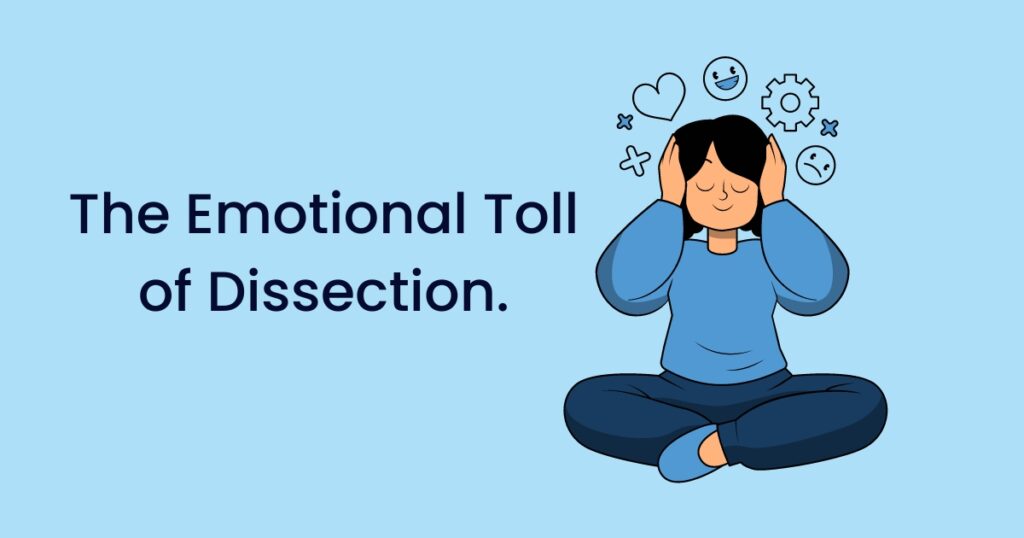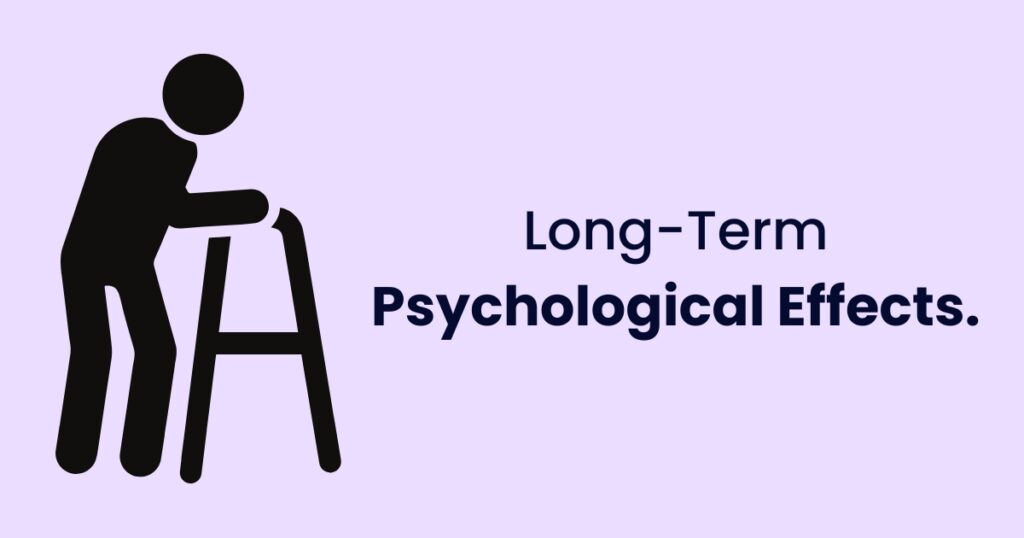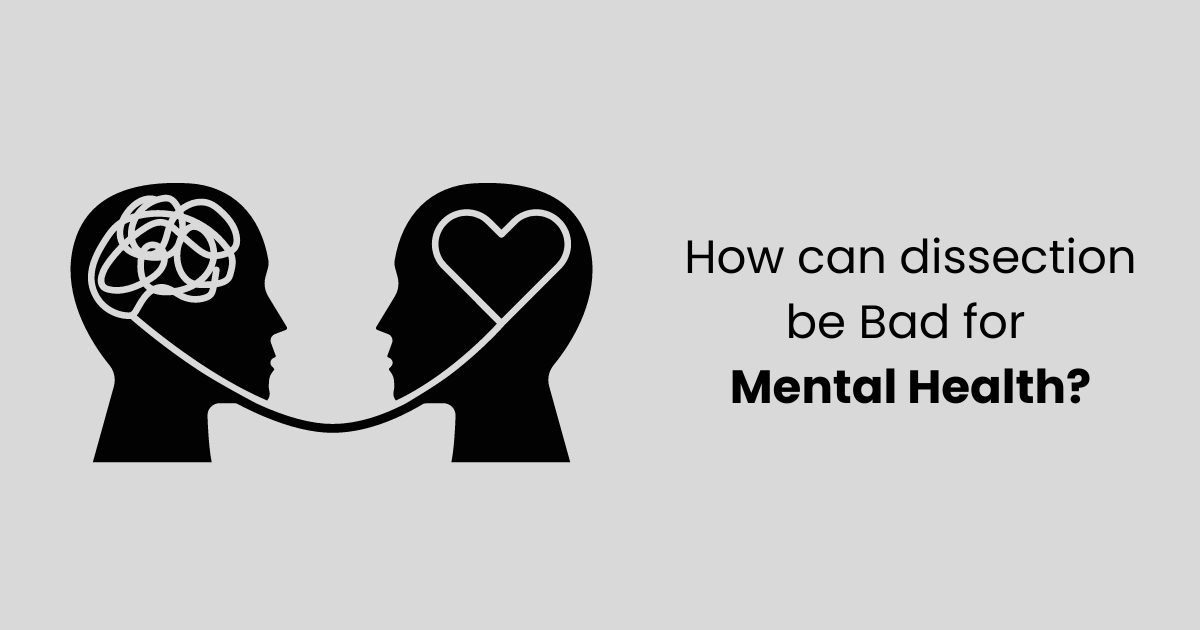For example, dissection slicing open and scrutinizing the internal organs of a dead animal has been an essential part of instruction in evolutionary fields like biology, medicine and veterinary science since time immemorial. Dissection can provide experiential learning and a more profound understanding of patients; yet, it may have severe psychological repercussions. The burden of emotions and mind that cuts dissection on students is an aspect of this practice which has considerable bearing, however frequently goes unexamined.
Here, we go into how dissection harms so many mental health noting the emotional stress it gives a student to be informed about ethical rights they possess as an individual and then on top of that trying not to scar their life by putting them through one traumatizing educational practice.

Emotional Toll of Dissection
Among the most immediate effects of dissection to consider is mental health, both in its contribution to emotional trauma and as a tool for learning. The first sight of a dead body, human or animal alike, will be quite shocking and unsettling for many students. This is due to the emotional spectrum ranging from cutting into flesh, looking at innards, and smelling formaldehyde. It is not unusual to experience anxiety, nausea and even fainting the first times you start dissecting.
It is a natural reaction and our bodies being hardwired for death, decay (danger) and disease knows what it must reject. This initial discomfort can develop into longer-lasting anxieties for some students. They can become viscerally repulsed by dissection or related duties, motivating increased anxiety and sometimes avoidance. At the very worst this can interfere with their schooling or business goals, especially fields where dissection is a key skill.
Professional mind worms and ethic cal conundrums.
There is also a major ethical question in violence due to dissection, which would add up mental stress. The morality of using animals in dissection especially is subject to debate. The prospect that animals have been specifically killed for the purpose of learning has some students severely distressed. This can generate cognitive dissonance, a state in which an individual experiences distress because they are holding mismatched core beliefs or values.
So, while a student may be invested in animal welfare for one class (which are primarily non-lab classes and VERY few labs courses) that same student can go on then to take dissection or misses where they will see animals dissected. They may try to rationalize it as something they have to do for their education, but that only makes it partly fine for them. Slowly but surely, the cognitive dissonance created between what we believe and how do to can turn into guilt, or shame —or have us become emotional zombies.
Additionally, Expected Participation: Even though the students believe dissection to be unethical or ideologically opposed, they feel forced by expectations of academia thus giving up autonomy and self-efficacy. This feeling of helplessness only serves to elevate strain and is also associated with adverse mental health consequences such as depression and anxiety.
Numbness and Desensitization.
Over time, repeated exposure to dissection can also desensitize those who engage in the practice by diminishing their sense of brutality and morbidity. A certain amount of desensitization is necessary for healthcare providers to function in their jobs, but it can also lead to unintended consequences.
At the same time, they may experience a more profound numbing of emotions in which individuals begin to deny their feelings or emotionally disconnect as a defense mechanism. For example, in the context of dissection, this might mean that students develop a reduced affective response to death and suffering overall (including outside of the lab). For instance, a pre-med student may become emotionally detached during dissection which will make it harder for him or her to care about patients in a medical setting. This lack of empathy leads to reduced patient care and personal distancing.
Moreover, long-term emotional suppression associated with prolonged exposure to dissection might also increase the risk for depression and anxiety [22]. This tears a physician in two; on the one hand, they need to suppress all emotions that might come from watching death and pain, but deep down inside, we know most humans have empathy. This dissonance can cause chronic stress within the individual.

Long Term psychological effects
The psychological sequelae of dissection may prove to be a fertile ground for future investigations as well. Some will only suffer transient distress; others may go on to experience longer-term mental health problems. Specifically, students who are highly vulnerable to developing emotional or psychological issues (e.g., anxiety/depression) may be particularly at risk of being negatively affected by the experience of dissection.
Long term, people who have been through trauma—even if they experienced PTSD before—could be at a new or renewed risk for developing Post-Traumatic Stress Disorder (PTSD). The visions, odors, and even noise of dissection could trigger memories of previous traumas. The repeated, albeit indirect action of dissection even for those with no history of psychological trauma( simultaneously experienced in an emotionally laden context i.e. a cadaver lab) may provoke PTSD symptoms secondary to cumulative stress e.g., flashbacks, nightmares or hypervigilance.
Furthermore, the moral dilemmas that stem from dissection can lead to an individual’s crisis of identity and subsequent loss of self-respect. When students are made to question their ethical standards, guilt may persist long after the test has been handed in, and a feeling of shame can run like sap through someone’s self-worth for years. Chronic emotional pain is an effective stopper greater than any single failing grade ever could be. They can lead to burnout, or a state of emotional, physical and mental exhaustion resulting from the experience of chronic stress in high-stress professions such as medicine.
How to deal with Alternatives.
Since dissection may pose a risk to mental health, it is important for schools and universities to offer support systems or alternative methods. Possible ways to avoid or alleviate the emotional toll include:
Pre-Dissection Counseling:
In the case of dissection, ensuring counselors are available to students BEFORE this process begins can help in emotional preparedness as well as coping skills. Additionally, counseling can aid students in processing their feelings and dealing with any qualms they may have about the ethics of dissection.
Peer Support Groups:
Support groups are one way to encourage a community of feelings among students dissertation. Peers, for example, are a good resource to use when people or students are finding themselves in ethical dilemmas and/or have emotional disturbances.
Ethics Education:
Curricular incorporation of ethics education for dissection bin At its best, good ethics education can provide a safe space to reflect on the motivations that underpin dissection decisions and spark curiosity about other options for learning.
Alternative Learning Methods:
Technology has since progressed such that dissection is no longer a requisite for learning anatomy. Because of that, virtual dissection tools are proven to be effective alternatives so there can reduce some impacts related with brain etic and emotions from student. These should be highly or even openly recommended to the schools and universities, especially for people who have a moral issue with dissection, are grossed out by it-distressful-, etc.
Opt-Out Policies:
In their chapter about humane alternatives to animal dissection in academia, the authors of Making a Killing recommend that schools and universities establish clear opt-out policies for students who do not want to participate in dissections. These policies should protect students from any type of penalty for opting out and ensure that other learning materials are still available.
Conclusion
Although dissection will continue to be an valuable learning tool in some disciplines, we are responsible for recognizing the potential mental health threats present and attempting mitigate them. This leads to emotional trauma, difficult ethical choices or the desensitization of so many medical professionals over time and is considered to be mentally harmful in everyone from students through professionals. Educational institutions can do more to address the risks associated with student testing stress by providing support, offering alternatives, and creating a culture that takes ethical concerns seriously.

